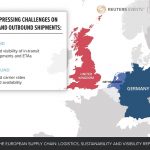Industry Talk
Regular Industry Development Updates, Opinions and Talking Points relating to Manufacturing, the Supply Chain and Logistics.Why the food and beverage industry needs to reassess its approach to ERP

It’s 2020 and, like it or not, we’re all living and working in a digital world. Whereas once investing in the latest technology was a good way of stealing a march on the competition, providing that all-important competitive edge, now it can prove to be more a case of ‘so what?’, with more and more businesses investing in the same technology to merely stay profitable never mind become a market leader.
This is particularly the case when it comes to food and beverage manufacturing, where ever-squeezed margins result in the constant quest to do more for less, all while keeping that one step ahead of the competition. And, while ERP solutions form the backbone of many food and beverage businesses, what was good enough a few years ago isn’t necessarily good enough now, unable to rise to the challenges of trying to stay competitive in this new decade
Food-focussed
So, what can food and beverage businesses do? Well, they can start by ensuring their ERP solution is the right fit for their business. While it’s not necessary to create a bespoke solution for every implementation, investing in solutions specifically designed to deal with the complexities and nuances of the food and beverage industry is a must. Not only do these solutions bring with them sector specific capabilities and templates, but they also bring with them sector specific expertise in the shape of consultants who are not only ERP experts but food and beverage experts, too.
Complementary technologies
ERP alone is no longer enough to ensure a food and beverage business stands out from the crowd, with a real need to embrace digitisation right across the business and extend the solution landscape beyond the limits of certain ERP solutions. Bringing in solutions that look after the shop-floor and warehouse management, for example, puts technology at the heart of every part of the business, with the right solutions able to be fully amalgamated and integrated to provide previously unseen levels of actionable insight. Not only does this enable the business to pinpoint opportunities for efficiency savings in all corners of the organisation, but the bringing together of seemingly disparate business processes and functions makes for a more agile, responsive organisation, as well as nurturing a culture of continuous cooperation and improvement.
SaaS value
Yet further efficiency savings can be realised through the intelligent deployment of systems, too, with more and more food and beverage businesses heading cloud-ward with a view to supporting their digital transformation for the good of the organisation. By going down the Software as a Service (SaaS) route, opting for a cloud deployment, not only are businesses saving themselves the time, effort and cost involved in hosting and managing solutions on premise, but they’re benefiting from faster, more regular updates and upgrades, keeping pace with the ever-increasing rate at which technology develops. And, in-house resources can be diverted away from day-to-day solution issues, focussing instead on adding real strategic value to the rest of the business.
For food and beverage business to use technology, and ERP systems in particular, to gain that vital competitive edge, they need to reassess how they use it. Good enough is no longer acceptable for those businesses who are serious about deriving real value from their solutions. By choosing the right combination of technologies, deployed in the most effective way possible, food and beverage businesses can future-proof their technology investments, all while securing real cost and efficiency savings for an overwhelmingly positive effect on the bottom line.
For more information on how Aptean can help your food and beverage business meet the challenges 2020 brings, contact [email protected]










